本文来源电子发烧友社区,作者:李先生, 帖子地址:https://bbs.elecfans.com/jishu_2300846_1_1.html
前言
RAM是影响整体性能的一个重要因数,我们现在对板子的RAM读写性能进行测试。
代码
Windows主机下下载代码
git clone [https://github.com/qinyunti/STREAM.git](https://github.com/qinyunti/STREAM.git)
/*-----------------------------------------------------------------------*/
/* Program: STREAM */
/* Revision: $Id: stream.c,v 5.10 2013/01/17 16:01:06 mccalpin Exp mccalpin $ */
/* Original code developed by John D. McCalpin */
/* Programmers: John D. McCalpin */
/* Joe R. Zagar */
/* */
/* This program measures memory transfer rates in MB/s for simple */
/* computational kernels coded in C. */
/*-----------------------------------------------------------------------*/
/* Copyright 1991-2013: John D. McCalpin */
/*-----------------------------------------------------------------------*/
/* License: */
/* 1. You are free to use this program and/or to redistribute */
/* this program. */
/* 2. You are free to modify this program for your own use, */
/* including commercial use, subject to the publication */
/* restrictions in item 3. */
/* 3. You are free to publish results obtained from running this */
/* program, or from works that you derive from this program, */
/* with the following limitations: */
/* 3a. In order to be referred to as "STREAM benchmark results", */
/* published results must be in conformance to the STREAM */
/* Run Rules, (briefly reviewed below) published at */
/* http://www.cs.virginia.edu/stream/ref.html */
/* and incorporated herein by reference. */
/* As the copyright holder, John McCalpin retains the */
/* right to determine conformity with the Run Rules. */
/* 3b. Results based on modified source code or on runs not in */
/* accordance with the STREAM Run Rules must be clearly */
/* labelled whenever they are published. Examples of */
/* proper labelling include: */
/* "tuned STREAM benchmark results" */
/* "based on a variant of the STREAM benchmark code" */
/* Other comparable, clear, and reasonable labelling is */
/* acceptable. */
/* 3c. Submission of results to the STREAM benchmark web site */
/* is encouraged, but not required. */
/* 4. Use of this program or creation of derived works based on this */
/* program constitutes acceptance of these licensing restrictions. */
/* 5. Absolutely no warranty is expressed or implied. */
/*-----------------------------------------------------------------------*/
# include
# include
# include
# include
# include
# include
/*-----------------------------------------------------------------------
* INSTRUCTIONS:
*
* 1) STREAM requires different amounts of memory to run on different
* systems, depending on both the system cache size(s) and the
* granularity of the system timer.
* You should adjust the value of 'STREAM_ARRAY_SIZE' (below)
* to meet *both* of the following criteria:
* (a) Each array must be at least 4 times the size of the
* available cache memory. I don't worry about the difference
* between 10^6 and 2^20, so in practice the minimum array size
* is about 3.8 times the cache size.
* Example 1: One Xeon E3 with 8 MB L3 cache
* STREAM_ARRAY_SIZE should be >= 4 million, giving
* an array size of 30.5 MB and a total memory requirement
* of 91.5 MB.
* Example 2: Two Xeon E5's with 20 MB L3 cache each (using OpenMP)
* STREAM_ARRAY_SIZE should be >= 20 million, giving
* an array size of 153 MB and a total memory requirement
* of 458 MB.
* (b) The size should be large enough so that the 'timing calibration'
* output by the program is at least 20 clock-ticks.
* Example: most versions of Windows have a 10 millisecond timer
* granularity. 20 "ticks" at 10 ms/tic is 200 milliseconds.
* If the chip is capable of 10 GB/s, it moves 2 GB in 200 msec.
* This means the each array must be at least 1 GB, or 128M elements.
*
* Version 5.10 increases the default array size from 2 million
* elements to 10 million elements in response to the increasing
* size of L3 caches. The new default size is large enough for caches
* up to 20 MB.
* Version 5.10 changes the loop index variables from "register int"
* to "ssize_t", which allows array indices >2^32 (4 billion)
* on properly configured 64-bit systems. Additional compiler options
* (such as "-mcmodel=medium") may be required for large memory runs.
*
* Array size can be set at compile time without modifying the source
* code for the (many) compilers that support preprocessor definitions
* on the compile line. E.g.,
* gcc -O -DSTREAM_ARRAY_SIZE=100000000 stream.c -o stream.100M
* will override the default size of 10M with a new size of 100M elements
* per array.
*/
#ifndef STREAM_ARRAY_SIZE
# define STREAM_ARRAY_SIZE 10000000
#endif
/* 2) STREAM runs each kernel "NTIMES" times and reports the *best* result
* for any iteration after the first, therefore the minimum value
* for NTIMES is 2.
* There are no rules on maximum allowable values for NTIMES, but
* values larger than the default are unlikely to noticeably
* increase the reported performance.
* NTIMES can also be set on the compile line without changing the source
* code using, for example, "-DNTIMES=7".
*/
#ifdef NTIMES
#if NTIMES<=1
# define NTIMES 10
#endif
#endif
#ifndef NTIMES
# define NTIMES 10
#endif
/* Users are allowed to modify the "OFFSET" variable, which *may* change the
* relative alignment of the arrays (though compilers may change the
* effective offset by making the arrays non-contiguous on some systems).
* Use of non-zero values for OFFSET can be especially helpful if the
* STREAM_ARRAY_SIZE is set to a value close to a large power of 2.
* OFFSET can also be set on the compile line without changing the source
* code using, for example, "-DOFFSET=56".
*/
#ifndef OFFSET
# define OFFSET 0
#endif
/*
* 3) Compile the code with optimization. Many compilers generate
* unreasonably bad code before the optimizer tightens things up.
* If the results are unreasonably good, on the other hand, the
* optimizer might be too smart for me!
*
* For a simple single-core version, try compiling with:
* cc -O stream.c -o stream
* This is known to work on many, many systems....
*
* To use multiple cores, you need to tell the compiler to obey the OpenMP
* directives in the code. This varies by compiler, but a common example is
* gcc -O -fopenmp stream.c -o stream_omp
* The environment variable OMP_NUM_THREADS allows runtime control of the
* number of threads/cores used when the resulting "stream_omp" program
* is executed.
*
* To run with single-precision variables and arithmetic, simply add
* -DSTREAM_TYPE=float
* to the compile line.
* Note that this changes the minimum array sizes required --- see (1) above.
*
* The preprocessor directive "TUNED" does not do much -- it simply causes the
* code to call separate functions to execute each kernel. Trivial versions
* of these functions are provided, but they are *not* tuned -- they just
* provide predefined interfaces to be replaced with tuned code.
*
*
* 4) Optional: Mail the results to mccalpin@cs.virginia.edu
* Be sure to include info that will help me understand:
* a) the computer hardware configuration (e.g., processor model, memory type)
* b) the compiler name/version and compilation flags
* c) any run-time information (such as OMP_NUM_THREADS)
* d) all of the output from the test case.
*
* Thanks!
*
*-----------------------------------------------------------------------*/
# define HLINE "-------------------------------------------------------------n"
# ifndef MIN
# define MIN(x,y) ((x)<(y)?(x):(y))
# endif
# ifndef MAX
# define MAX(x,y) ((x)>(y)?(x):(y))
# endif
#ifndef STREAM_TYPE
#define STREAM_TYPE double
#endif
static STREAM_TYPE a[STREAM_ARRAY_SIZE+OFFSET],
b[STREAM_ARRAY_SIZE+OFFSET],
c[STREAM_ARRAY_SIZE+OFFSET];
static double avgtime[4] = {0}, maxtime[4] = {0},
mintime[4] = {FLT_MAX,FLT_MAX,FLT_MAX,FLT_MAX};
static char *label[4] = {"Copy: ", "Scale: ",
"Add: ", "Triad: "};
static double bytes[4] = {
2 * sizeof(STREAM_TYPE) * STREAM_ARRAY_SIZE,
2 * sizeof(STREAM_TYPE) * STREAM_ARRAY_SIZE,
3 * sizeof(STREAM_TYPE) * STREAM_ARRAY_SIZE,
3 * sizeof(STREAM_TYPE) * STREAM_ARRAY_SIZE
};
extern double mysecond();
extern void checkSTREAMresults();
#ifdef TUNED
extern void tuned_STREAM_Copy();
extern void tuned_STREAM_Scale(STREAM_TYPE scalar);
extern void tuned_STREAM_Add();
extern void tuned_STREAM_Triad(STREAM_TYPE scalar);
#endif
#ifdef _OPENMP
extern int omp_get_num_threads();
#endif
int
main()
{
int quantum, checktick();
int BytesPerWord;
int k;
ssize_t j;
STREAM_TYPE scalar;
double t, times[4][NTIMES];
/* --- SETUP --- determine precision and check timing --- */
printf(HLINE);
printf("STREAM version $Revision: 5.10 $n");
printf(HLINE);
BytesPerWord = sizeof(STREAM_TYPE);
printf("This system uses %d bytes per array element.n",
BytesPerWord);
printf(HLINE);
#ifdef N
printf("***** WARNING: ******n");
printf(" It appears that you set the preprocessor variable N when compiling this code.n");
printf(" This version of the code uses the preprocesor variable STREAM_ARRAY_SIZE to control the array sizen");
printf(" Reverting to default value of STREAM_ARRAY_SIZE=%llun",(unsigned long long) STREAM_ARRAY_SIZE);
printf("***** WARNING: ******n");
#endif
printf("Array size = %llu (elements), Offset = %d (elements)n" , (unsigned long long) STREAM_ARRAY_SIZE, OFFSET);
printf("Memory per array = %.1f MiB (= %.1f GiB).n",
BytesPerWord * ( (double) STREAM_ARRAY_SIZE / 1024.0/1024.0),
BytesPerWord * ( (double) STREAM_ARRAY_SIZE / 1024.0/1024.0/1024.0));
printf("Total memory required = %.1f MiB (= %.1f GiB).n",
(3.0 * BytesPerWord) * ( (double) STREAM_ARRAY_SIZE / 1024.0/1024.),
(3.0 * BytesPerWord) * ( (double) STREAM_ARRAY_SIZE / 1024.0/1024./1024.));
printf("Each kernel will be executed %d times.n", NTIMES);
printf(" The *best* time for each kernel (excluding the first iteration)n");
printf(" will be used to compute the reported bandwidth.n");
#ifdef _OPENMP
printf(HLINE);
#pragma omp parallel
{
#pragma omp master
{
k = omp_get_num_threads();
printf ("Number of Threads requested = %in",k);
}
}
#endif
#ifdef _OPENMP
k = 0;
#pragma omp parallel
#pragma omp atomic
k++;
printf ("Number of Threads counted = %in",k);
#endif
/* Get initial value for system clock. */
#pragma omp parallel for
for (j=0; j1.0;
b[j] = 2.0;
c[j] = 0.0;
}
printf(HLINE);
if ( (quantum = checktick()) >= 1)
printf("Your clock granularity/precision appears to be "
"%d microseconds.n", quantum);
else {
printf("Your clock granularity appears to be "
"less than one microsecond.n");
quantum = 1;
}
t = mysecond();
#pragma omp parallel for
for (j = 0; j < STREAM_ARRAY_SIZE; j++)
a[j] = 2.0E0 * a[j];
t = 1.0E6 * (mysecond() - t);
printf("Each test below will take on the order"
" of %d microseconds.n", (int) t );
printf(" (= %d clock ticks)n", (int) (t/quantum) );
printf("Increase the size of the arrays if this shows thatn");
printf("you are not getting at least 20 clock ticks per test.n");
printf(HLINE);
printf("WARNING -- The above is only a rough guideline.n");
printf("For best results, please be sure you know then");
printf("precision of your system timer.n");
printf(HLINE);
/* --- MAIN LOOP --- repeat test cases NTIMES times --- */
scalar = 3.0;
for (k=0; k0][k] = mysecond();
#ifdef TUNED
tuned_STREAM_Copy();
#else
#pragma omp parallel for
for (j=0; j#endif
times[0][k] = mysecond() - times[0][k];
times[1][k] = mysecond();
#ifdef TUNED
tuned_STREAM_Scale(scalar);
#else
#pragma omp parallel for
for (j=0; j#endif
times[1][k] = mysecond() - times[1][k];
times[2][k] = mysecond();
#ifdef TUNED
tuned_STREAM_Add();
#else
#pragma omp parallel for
for (j=0; j#endif
times[2][k] = mysecond() - times[2][k];
times[3][k] = mysecond();
#ifdef TUNED
tuned_STREAM_Triad(scalar);
#else
#pragma omp parallel for
for (j=0; j#endif
times[3][k] = mysecond() - times[3][k];
}
/* --- SUMMARY --- */
for (k=1; k/* note -- skip first iteration */
{
for (j=0; j<4; j++)
{
avgtime[j] = avgtime[j] + times[j][k];
mintime[j] = MIN(mintime[j], times[j][k]);
maxtime[j] = MAX(maxtime[j], times[j][k]);
}
}
printf("Function Best Rate MB/s Avg time Min time Max timen");
for (j=0; j<4; j++) {
avgtime[j] = avgtime[j]/(double)(NTIMES-1);
printf("%s%12.1f %11.6f %11.6f %11.6fn", label[j],
1.0E-06 * bytes[j]/mintime[j],
avgtime[j],
mintime[j],
maxtime[j]);
}
printf(HLINE);
/* --- Check Results --- */
checkSTREAMresults();
printf(HLINE);
return 0;
}
# define M 20
int
checktick()
{
int i, minDelta, Delta;
double t1, t2, timesfound[M];
/* Collect a sequence of M unique time values from the system. */
for (i = 0; i < M; i++) {
t1 = mysecond();
while( ((t2=mysecond()) - t1) < 1.0E-6 )
;
timesfound[i] = t1 = t2;
}
/*
* Determine the minimum difference between these M values.
* This result will be our estimate (in microseconds) for the
* clock granularity.
*/
minDelta = 1000000;
for (i = 1; i < M; i++) {
Delta = (int)( 1.0E6 * (timesfound[i]-timesfound[i-1]));
minDelta = MIN(minDelta, MAX(Delta,0));
}
return(minDelta);
}
/* A gettimeofday routine to give access to the wall
clock timer on most UNIX-like systems. */
#include
double mysecond()
{
struct timeval tp;
struct timezone tzp;
int i;
i = gettimeofday(&tp,&tzp);
return ( (double) tp.tv_sec + (double) tp.tv_usec * 1.e-6 );
}
#ifndef abs
#define abs(a) ((a) >= 0 ? (a) : -(a))
#endif
void checkSTREAMresults ()
{
STREAM_TYPE aj,bj,cj,scalar;
STREAM_TYPE aSumErr,bSumErr,cSumErr;
STREAM_TYPE aAvgErr,bAvgErr,cAvgErr;
double epsilon;
ssize_t j;
int k,ierr,err;
/* reproduce initialization */
aj = 1.0;
bj = 2.0;
cj = 0.0;
/* a[] is modified during timing check */
aj = 2.0E0 * aj;
/* now execute timing loop */
scalar = 3.0;
for (k=0; k/* accumulate deltas between observed and expected results */
aSumErr = 0.0;
bSumErr = 0.0;
cSumErr = 0.0;
for (j=0; jabs(a[j] - aj);
bSumErr += abs(b[j] - bj);
cSumErr += abs(c[j] - cj);
// if (j == 417) printf("Index 417: c[j]: %f, cj: %fn",c[j],cj); // MCCALPIN
}
aAvgErr = aSumErr / (STREAM_TYPE) STREAM_ARRAY_SIZE;
bAvgErr = bSumErr / (STREAM_TYPE) STREAM_ARRAY_SIZE;
cAvgErr = cSumErr / (STREAM_TYPE) STREAM_ARRAY_SIZE;
if (sizeof(STREAM_TYPE) == 4) {
epsilon = 1.e-6;
}
else if (sizeof(STREAM_TYPE) == 8) {
epsilon = 1.e-13;
}
else {
printf("WEIRD: sizeof(STREAM_TYPE) = %lun",sizeof(STREAM_TYPE));
epsilon = 1.e-6;
}
err = 0;
if (abs(aAvgErr/aj) > epsilon) {
err++;
printf ("Failed Validation on array a[], AvgRelAbsErr > epsilon (%e)n",epsilon);
printf (" Expected Value: %e, AvgAbsErr: %e, AvgRelAbsErr: %en",aj,aAvgErr,abs(aAvgErr)/aj);
ierr = 0;
for (j=0; jif (abs(a[j]/aj-1.0) > epsilon) {
ierr++;
#ifdef VERBOSE
if (ierr < 10) {
printf(" array a: index: %ld, expected: %e, observed: %e, relative error: %en",
j,aj,a[j],abs((aj-a[j])/aAvgErr));
}
#endif
}
}
printf(" For array a[], %d errors were found.n",ierr);
}
if (abs(bAvgErr/bj) > epsilon) {
err++;
printf ("Failed Validation on array b[], AvgRelAbsErr > epsilon (%e)n",epsilon);
printf (" Expected Value: %e, AvgAbsErr: %e, AvgRelAbsErr: %en",bj,bAvgErr,abs(bAvgErr)/bj);
printf (" AvgRelAbsErr > Epsilon (%e)n",epsilon);
ierr = 0;
for (j=0; jif (abs(b[j]/bj-1.0) > epsilon) {
ierr++;
#ifdef VERBOSE
if (ierr < 10) {
printf(" array b: index: %ld, expected: %e, observed: %e, relative error: %en",
j,bj,b[j],abs((bj-b[j])/bAvgErr));
}
#endif
}
}
printf(" For array b[], %d errors were found.n",ierr);
}
if (abs(cAvgErr/cj) > epsilon) {
err++;
printf ("Failed Validation on array c[], AvgRelAbsErr > epsilon (%e)n",epsilon);
printf (" Expected Value: %e, AvgAbsErr: %e, AvgRelAbsErr: %en",cj,cAvgErr,abs(cAvgErr)/cj);
printf (" AvgRelAbsErr > Epsilon (%e)n",epsilon);
ierr = 0;
for (j=0; jif (abs(c[j]/cj-1.0) > epsilon) {
ierr++;
#ifdef VERBOSE
if (ierr < 10) {
printf(" array c: index: %ld, expected: %e, observed: %e, relative error: %en",
j,cj,c[j],abs((cj-c[j])/cAvgErr));
}
#endif
}
}
printf(" For array c[], %d errors were found.n",ierr);
}
if (err == 0) {
printf ("Solution Validates: avg error less than %e on all three arraysn",epsilon);
}
#ifdef VERBOSE
printf ("Results Validation Verbose Results: n");
printf (" Expected a(1), b(1), c(1): %f %f %f n",aj,bj,cj);
printf (" Observed a(1), b(1), c(1): %f %f %f n",a[1],b[1],c[1]);
printf (" Rel Errors on a, b, c: %e %e %e n",abs(aAvgErr/aj),abs(bAvgErr/bj),abs(cAvgErr/cj));
#endif
}
#ifdef TUNED
/* stubs for "tuned" versions of the kernels */
void tuned_STREAM_Copy()
{
ssize_t j;
#pragma omp parallel for
for (j=0; jvoid tuned_STREAM_Scale(STREAM_TYPE scalar)
{
ssize_t j;
#pragma omp parallel for
for (j=0; jvoid tuned_STREAM_Add()
{
ssize_t j;
#pragma omp parallel for
for (j=0; jvoid tuned_STREAM_Triad(STREAM_TYPE scalar)
{
ssize_t j;
#pragma omp parallel for
for (j=0; j/* end of stubs for the "tuned" versions of the kernels */
#endif
;>;>;>;>;>;>;>;>;>;>;>;>;>;>;>;>
编译运行
sftp将STREAM/stream.c导入到开发板
gcc stream.c -o stream -O3编译
运行
./stream
总结
可以看到RAM的读写性能非常不错的达到了4GB多/S
声明:本文内容及配图由入驻作者撰写或者入驻合作网站授权转载。文章观点仅代表作者本人,不代表电子发烧友网立场。文章及其配图仅供工程师学习之用,如有内容侵权或者其他违规问题,请联系本站处理。
举报投诉
-
米尔科技
+关注
关注
5文章
227浏览量
22162 -
MYD-J1028X
+关注
关注
1文章
16浏览量
421
发布评论请先 登录
相关推荐
热点推荐





 【米尔MYD-J1028X开发板试用体验】性能测试之RAM性能测试
【米尔MYD-J1028X开发板试用体验】性能测试之RAM性能测试

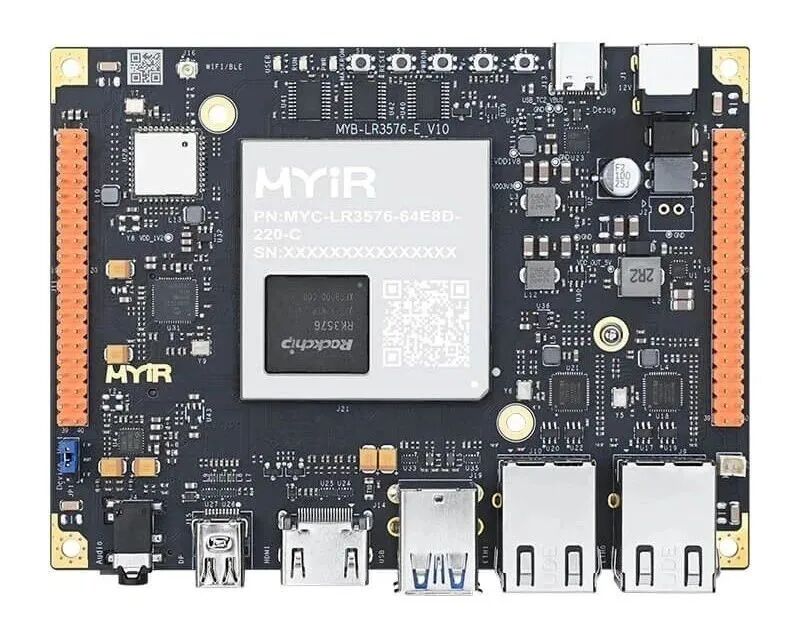
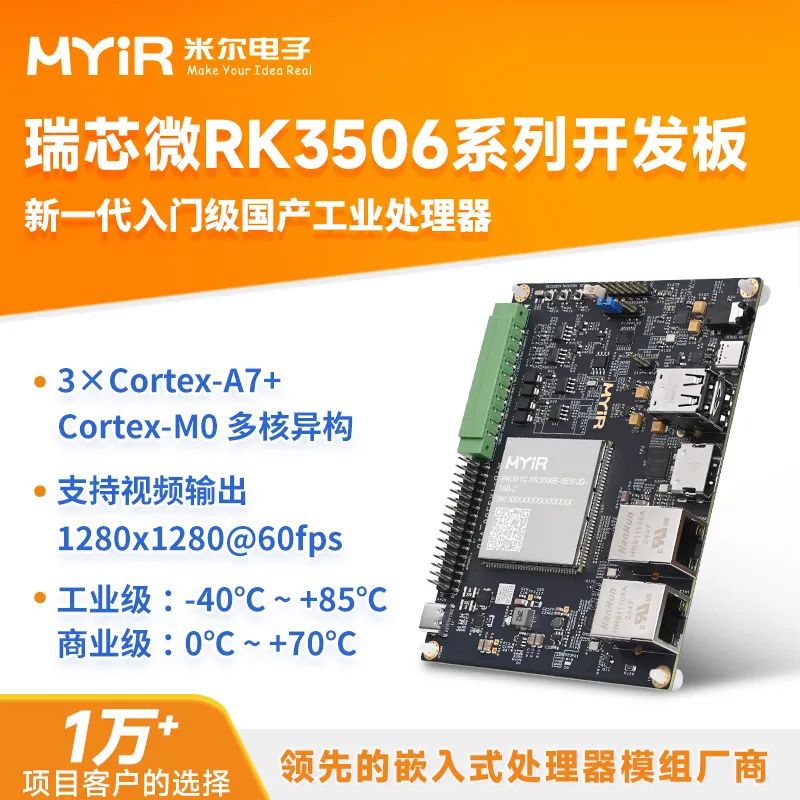
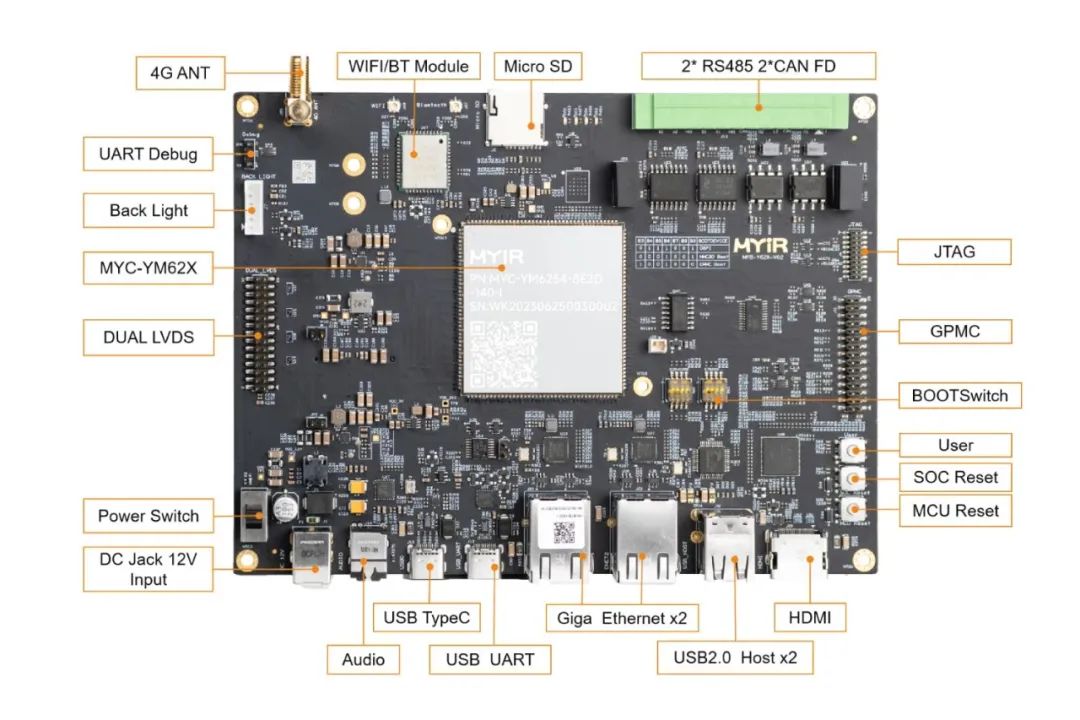
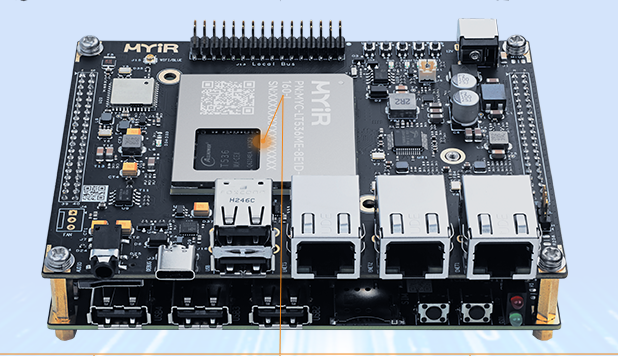



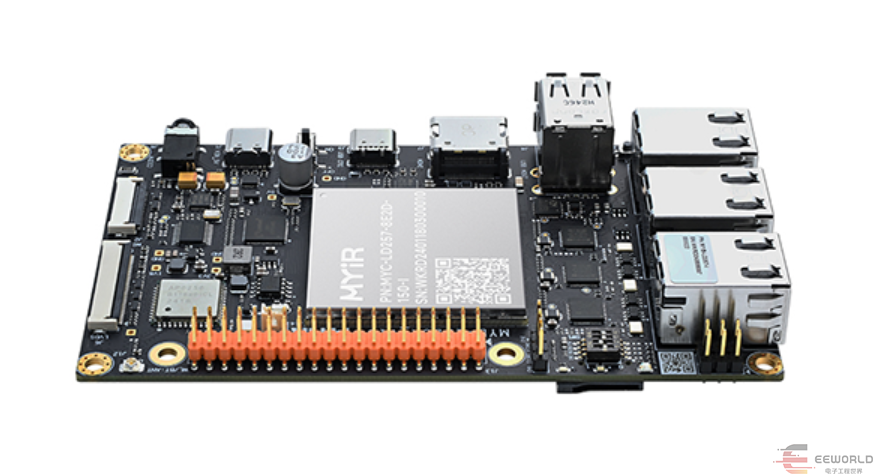
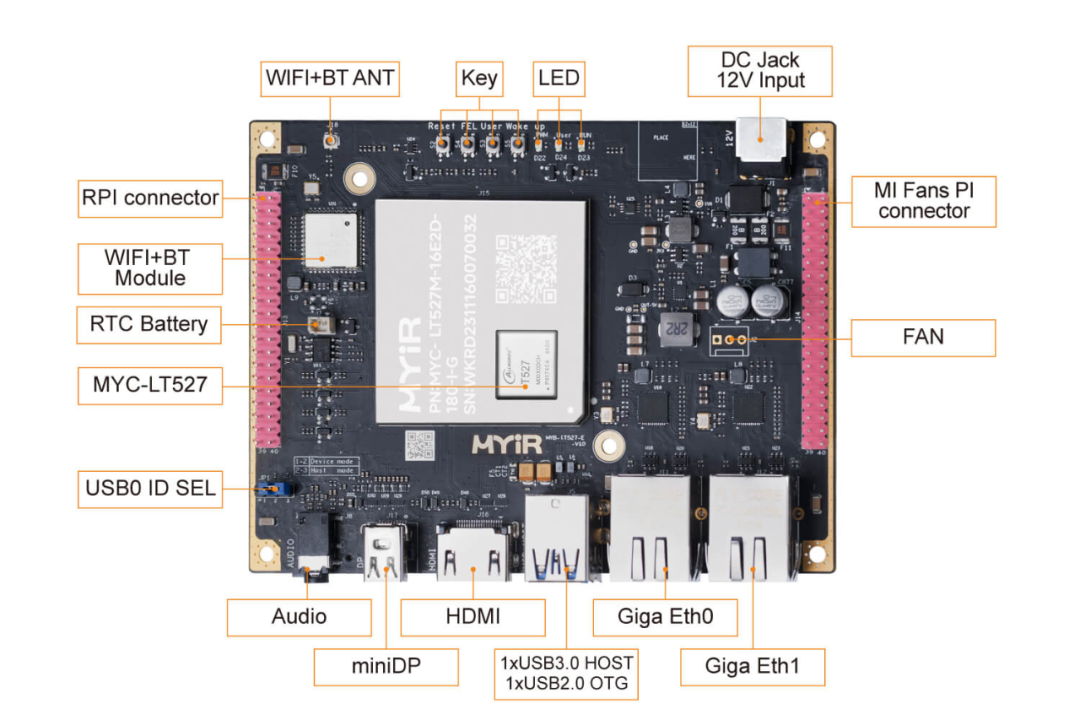











评论